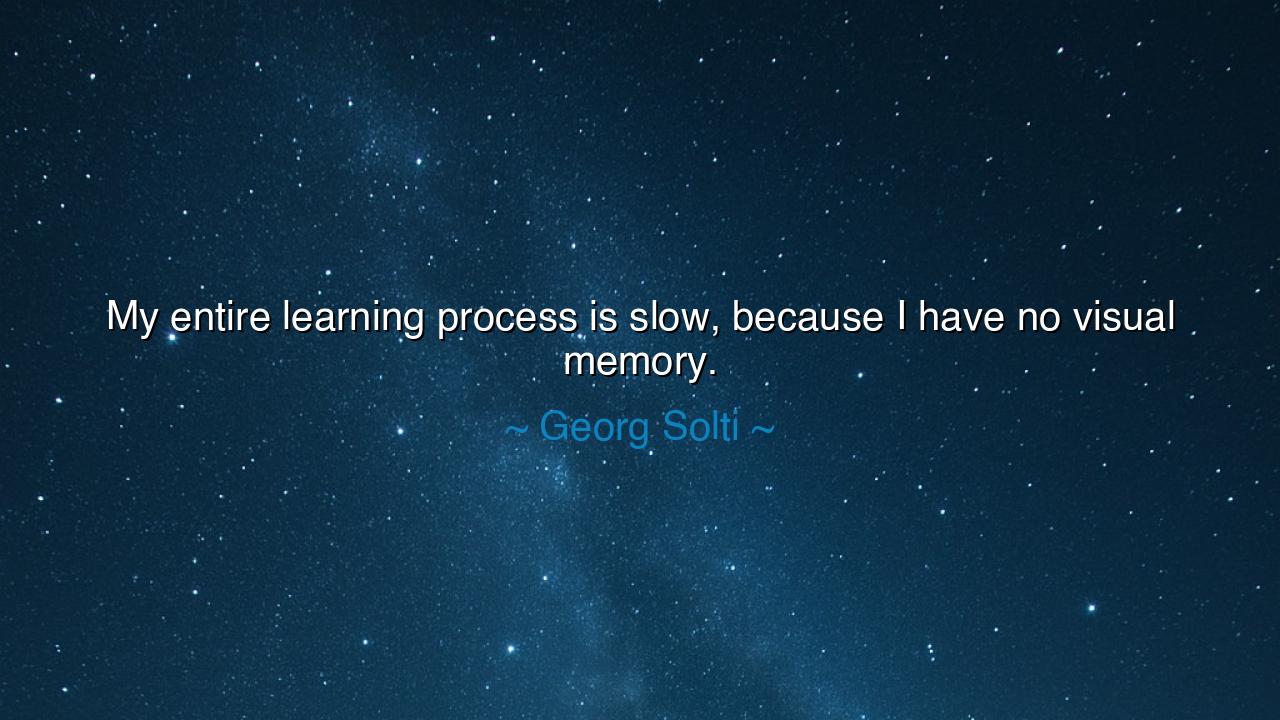
My entire learning process is slow, because I have no visual






Hear now the words of Georg Solti, the great conductor, who once declared: “My entire learning process is slow, because I have no visual memory.” In this humble confession lies a profound truth about the nature of human endeavor. For even the mighty who move orchestras and command the thunder of symphonies carry burdens unseen. Solti admits not to a weakness of spirit, but to a challenge of perception—yet from that challenge he carved greatness. His words shine like a lantern to those who feel hindered by their own limitations, reminding them that slowness is not failure, but another path to mastery.
To have no visual memory is to walk without the gift of easy recall, to labor without the aid of imagery that many rely upon. For most, the page of notes, the movements of a score, the gestures of a teacher, are imprinted in the mind’s eye. But for Solti, this eye was darkened, and his learning process became long and arduous. Yet, he did not despair. Instead, he embraced the slowness, grinding each step of his path until it shone with clarity. His words tell us that speed is not the measure of wisdom—endurance is.
Consider the example of Demosthenes, the ancient orator of Athens. He was born with a weak voice and a stutter, mocked by his peers, told he could never speak with the power of statesmen. But he filled his mouth with pebbles, stood by the sea, and forced his words to rise above the roar of waves. Slowly, painfully, he shaped himself into the greatest orator of Greece. His process was slow, his obstacles immense, yet his legacy endured for centuries. So it is with Solti, who, though bereft of quick memory, carved his greatness through relentless persistence.
Solti’s words remind us that slowness need not be scorned. In a world that worships speed, it is easy to believe that those who learn slowly are lesser. But history shows us otherwise. The oak grows slower than the reed, yet its roots are deeper, its branches stronger. The river carves valleys not in an instant, but over the course of centuries, wearing down stone until beauty is revealed. So too with the learner who advances inch by inch—their knowledge is not fleeting, but deeply etched into the soul.
Yet, we must also hear the undertone of struggle in Solti’s confession. His process was not one of ease, but of frustration. To be slow in a fast world is to suffer doubt, to feel unworthy, to question one’s own gifts. And yet, he pressed forward. He turned his limitation into discipline, his struggle into strength. In this way, he teaches us that our weaknesses are not chains, but chisels—tools that, though sharp and painful, shape us into something greater than we imagined.
The lesson is clear: each person’s path to knowledge is different. Do not despise your pace. Do not compare your learning to the swiftness of another. What matters is not how quickly you reach the summit, but that you continue climbing. For the mountain does not care how long it takes you to ascend—only that you endure and rise. Let Solti’s words free you from the tyranny of comparison, and inspire you to honor your own rhythm of growth.
Practical action lies before us. When you struggle, do not curse the slowness of your progress; instead, build habits of patience. Break tasks into smaller steps, celebrate small victories, and return to the work with constancy. Seek methods that match your nature: if the eye fails you, use the ear; if memory falters, rely on repetition; if speed eludes you, cling to perseverance. In this way, what once seemed a weakness becomes the forge of your strength.
Thus, the words of Georg Solti are more than a personal confession—they are a teaching for all who labor under burdens unseen. Learning is not a race, but a pilgrimage; and though some may arrive quickly, the slow pilgrim who endures will also reach the temple gates. Remember this: greatness is not born from ease, but from steadfastness. Therefore, let none despair at their own slowness, but embrace it as the rhythm by which their destiny shall unfold.






AAdministratorAdministrator
Welcome, honored guests. Please leave a comment, we will respond soon